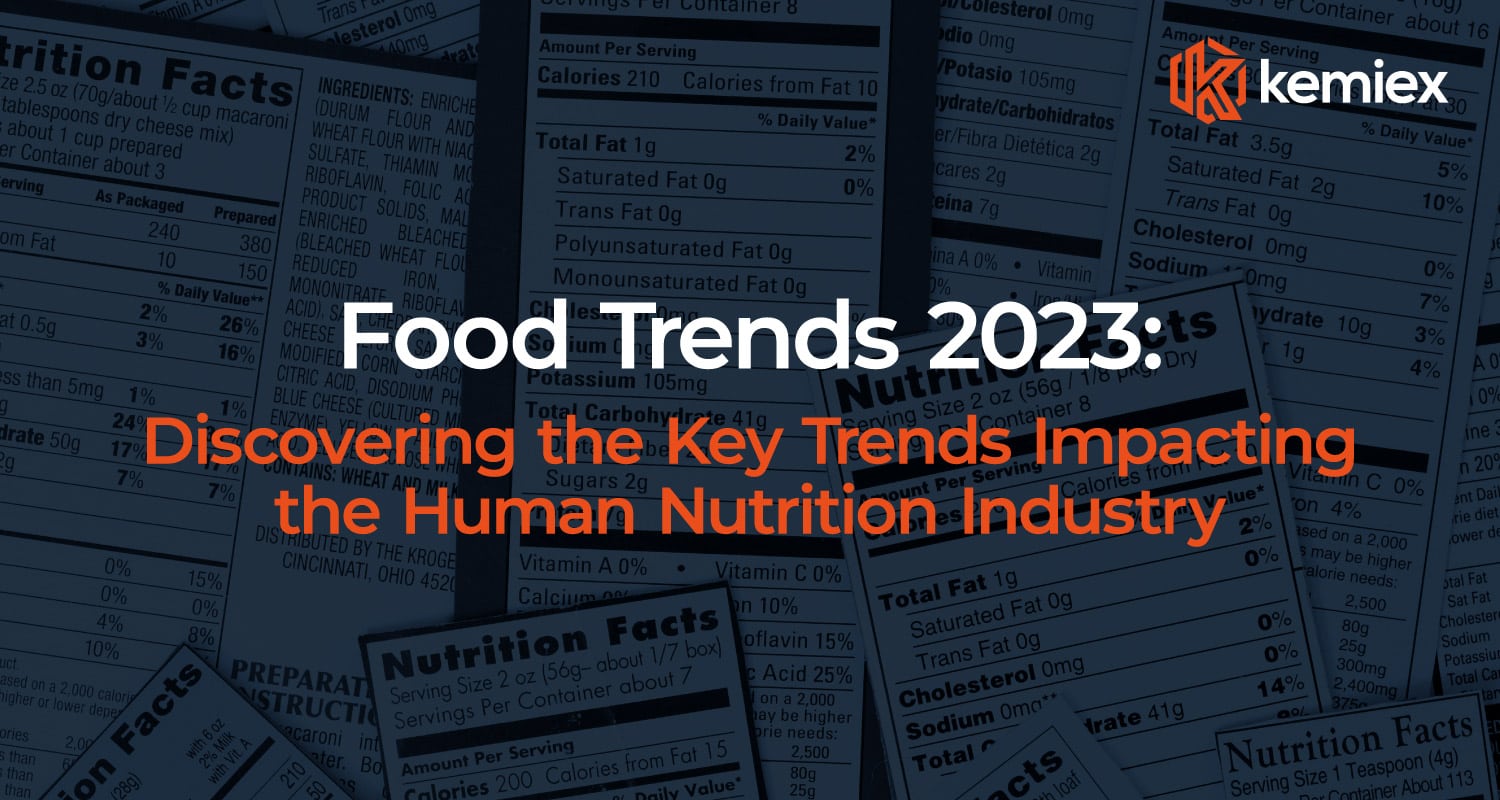Kemiex Webinarr

Food Trends 2023: Discovering the Key Trends Impacting the Human Nutrition Industry
The world of human nutrition is in the midst of a transformative shift, fueled by evolving consumer preferences, technological advancements, and a growing emphasis on sustainable practices.
In this article, we will explore the key trends that are poised to reshape the human nutrition industry throughout 2023. Understanding and adapting to these trends will be crucial for food industry stakeholders who are aiming to thrive in an ever-changing market landscape.
Food Trend 1: Nutraceuticals and Functional Foods
Consumers are increasingly seeking out food products that not only provide essential nutrition but also offer additional health benefits.
Nutraceuticals and functional foods have gained popularity as they support overall wellness, immune health, cognitive function, and address specific health concerns. This presents exciting opportunities for innovative product development and formulation.
Nutraceuticals are products that are derived from food sources and provide health benefits beyond their basic nutritional value. They are often taken in the form of supplements, but can also be found in fortified foods or beverages. Nutraceuticals may contain bioactive compounds, such as vitamins, minerals, antioxidants, or phytochemicals, that have been shown to have positive effects on human health.
Functional foods, on the other hand, are whole foods or food products that have been enriched or fortified with specific nutrients or bioactive compounds to provide health benefits beyond their basic nutrition. These foods are designed to target specific health concerns or improve overall wellness. Functional foods can include items like fortified cereals, probiotic yogurt, omega-3 enriched eggs, or beverages with added antioxidants.
Food Trend 2: Personalized Nutrition
As consumers become increasingly aware of the impact of nutrition on their individual health needs, personalized nutrition solutions are becoming highly sought after.
Technological advancements, such as genetic testing and digital health platforms, enable personalized nutrition recommendations and tailor-made food products that cater to specific dietary requirements and health goals.
Food Trend 3: Clean Label and Transparency
In an era marked by a greater focus on personal well-being, consumers are demanding products with clean labels that are devoid of artificial additives.
They want ingredient lists that are transparent and easily understandable. As a result, food manufacturers are striving to enhance product transparency, improve labeling practices, and source ingredients from reliable and sustainable suppliers.
Food Trend 4: Digitalization and Smart Technologies
The adoption of digital technologies, such as Internet of Things (IoT), blockchain, and data analytics, is transforming the food industry.
From precision farming and supply chain traceability to personalized nutrition and real-time monitoring, digitalization is enhancing operational efficiency, food safety, and quality control.
Food Trend 5: Sustainability and Circular Economy
Sustainability is now a core priority for the food industry, and stakeholders throughout the value chain are taking significant steps to adopt sustainable practices.
This includes sustainable sourcing, reducing waste, innovating packaging, and minimizing carbon footprints. The adoption of circular economy principles, such as food waste reduction, recycling, and upcycling, is also gaining rapid momentum.
Food Trend 6: Demand for Plant-Based and Alternative Proteins
Driven by health, environmental, and ethical considerations, there is a surging consumer demand for plant-based and alternative protein sources.
The food industry is witnessing a proliferation of innovative plant-based products, along with advancements in cellular agriculture, providing sustainable and nutritious alternatives to traditional animal-derived proteins.
Conclusion
The human nutrition industry is undergoing a profound transformation, driven by changing consumer dynamics, rapid technological advancements, and the pressing need for sustainability.
Embracing the key trends of nutraceuticals, personalized nutrition, clean label and transparency, digitalization, sustainability, and plant-based proteins will be pivotal for food industry stakeholders aiming to thrive in the year 2023 and beyond.
By embracing these trends, stakeholders can unleash their innovative potential, meet the evolving demands of consumers, and actively contribute to a healthier and more sustainable future in the realm of human nutrition.